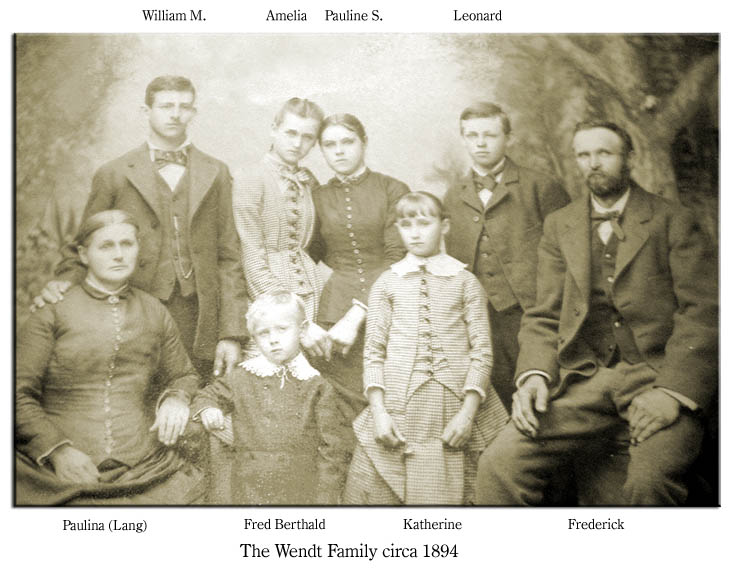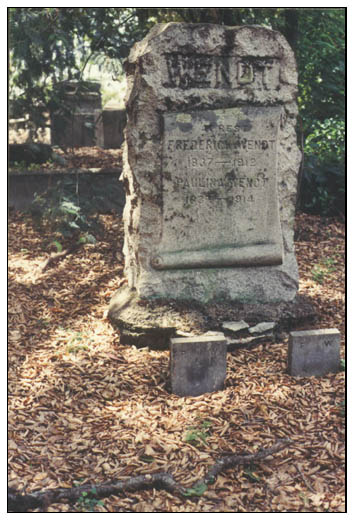Father: Frederick WENDT
Mother: Dorothea (WENDT)
Family 1 : Paulina LANG
__
__|
| |__
_Frederick WENDT __|
| | __
| |__|
| |__
|
|--Frederick WENDT
|
| __
| __|
| | |__
|_Dorothea (WENDT) _|
| __
|__|
|__
![]()
Notes:

|
The meaning of the name Wendt is "of the Wend." The Wend were a group of people descended from slavic tribes which settled in central Europe. More specifically, the Lusicia were a tribe of West Slavs which settled in the 6th century AD between the River Spree in the north and the Mittelgebirge Mountains in the south, in an area south-east of present day Berlin, and which became known as Lusatia. Also, there was a tribe of Milzeni who settled in the north near where the Spree intersected the ancient trade-route from Cologne to Kiev, with this area becoming known as Upper Lusatia. By the tenth century, a shared language emerged distinguished by an "upper" and "lower" variant dependant upon this geographical/tribal split. By the 19th century however, these people were largely absorbed as well as exterminated by surrounding cultures. The Latin-derived term wend became largely a derogatory term used by the surrounding Frankish, Saxon and other cultures to describe these Slavonic people. The more proper term now is Sorb, with the Lower Sorbian word for 'a Sorb' being Serb. Though the Sorbs of Lower Lusatia presently prefer to be called in German, Wenden, rather than Sorben. The Sorbian culture and language still exists today but is little known outside of Germany. There are very few books in English available about them, these include The Smallest Slavonic Nation: the Sorbs of Lusatia, by Gerald Stone (1972), The Sorbs, Wends of Lusatia: the unknown immigrants, by B. Hall (1989), and In Search of a Home: Nineteenth-Century Wendish Immigration, by George R. Nielswn (1989). There is also a Sorbian Cultural Information website which has informative essays on the history, culture, and language of the Wend. In 1832, with the passing of agrarian reform law in Prussia, an anti-minority pogrom was launched which dispossessed the Sorbs of their property and put them into serfdom to their Teutonic lords. They were implored to use the German language rather than their native Wendish. Also, they were forced to quit their indigenous Lutheran Wendish services and join the "new" evangelical reform churches. Sorbs believed that this would dilute their pure Lutheran faith along with extinguishing their native culture. Many immigrated to America, with a large community of Wend being formed in Texas. In such communities they had the freedom to continue to attend Lutheran church services in Sorbian and well as celebrate their culture. In 1851, Frederick Wendt appears to have immigrated from perhaps Wiesbaden to America with at least his mother and his sister. The family settled in New Jersey. New Jersey was not really known as a Sorbish enclave at this time. Whether or not Frederick had a strong Sorbish heritage or that he belonged to a family which had once acted like the wend is not known. Information about his life in Prussia has not been discovered yet, and it is also quite possible that the family left its Sorbish roots many generations before. Frederick Wendt was naturalized in New Jersey, November 1, 1858 according to the Great Register of Voters Sonoma County, California 1890 (Sonoma County Genealogical Society, Inc., Santa Rosa, CA: 1st Edition, April 1989). His step-father, William Baker, had come out to Sonoma County in 1855 to start up a blacksmithing business and then returning to New Jersey in 1860 (after the census was taken). He returned to Santa Rosa bringing back with him the rest of his family (which would have included at least Frederick, his wife Dorothy, his son Henry, his step-daughter Wilheminia, and her husband Leonard Schwan). In the 1900 Census, a Willie Reid, "SR", b. Apr 1876, a. 24, CA is listed living with the Frederick and Paulina Wendt family. Leonard, Katherine, and Fred B. living in same household in 1900. According to the 1910 Census, Frederick's & Paulina's household was also occupied by their son Leonard, his wife Martha and daughter Gladys, Katherine Wendt, and Fred B. Wendt and his wife Mayme. Listed in Sonoma County Marriages 1847-1902 (Sonoma County Genealogical Society, Inc., Santa Rosa, CA: 1st Edition, March 1980) as Frederick Wendt (Sonoma Marriages Book B Page 625, M. K. McCorkle, Officiant). There is a short biography about him in History of Sonoma County, by J. P. Munro-Fraser (Alley, Bowen & Co.: 1880) p. 668: |
|
Frederick Wendt
|
|
|
|
He does not appear in the 1860 Census for Sonoma County. What was he doing in Arizona? In volume 2 of General Nelson A. Miles recollections, Personal Recollections & Observations of General Nelson A. Miles about military actions in early Arizona, one finds: |
|
In February, 1862, the Confederates took possession of a portion of the country "Arizona", but retreated in May on the coming of a column of volunteers from California. The presence of these inspired confidence, and settlers again ventured into the Territory. Gold was discovered on the Colorado, and business once more began to revive. It was not until 1863 that the country gained a political existence separate from New Mexico. During the following ten years its history was a bloody one, the Indians laying waste to the country and killing the white settlers whenever they could get an opportunity. But immigration still went on, the rich mines being the lodestone that drew crowds of adventurers in spite of the terror inspired by the Apaches.
|
|
He would have been 26 in 1863. I have looked at lists of Civil War solders from California and never have found a Frederick Wendt, however, I have not looked at all such lists thoroughly. I do not know how extensive the records are for California volunteers at that time either. Perhaps more likely, he went there in search of gold, but returned because of the problems with the Apaches.
|
|
Frederick Wendt transfered several pieces of land which I have extracted here.
|
|
Newspaper clippings
kept by my grandmother about the Wendt family: |
|
|
|
Having thought for a long time as the result of no contacts, that my own branch of the family was probably the only one which had continued to exist, I was surprised in November of 2002 by an email from a great grandson of Fred B. Wendt, Craig Harwood. I had known from my grandmother, that Fred and Mayme had a child, but we knew nothing else about what ever had happened to him. Craig had information about the family which I had never heard before, and his mother, the former Marcia Wendt, wrote a long message about the family, "The Frederick Wendt Ranch and the Fred Wendt Creek House/Cottage", and emailed it to me. My contact with this branch of the family was the impetus for me to finally cull together what little information I had about my Wendt family and finally launch this website. |
|
|

![]()
This page created on 12/22/2002 13:37. Updated 01/12/2004 22:49.